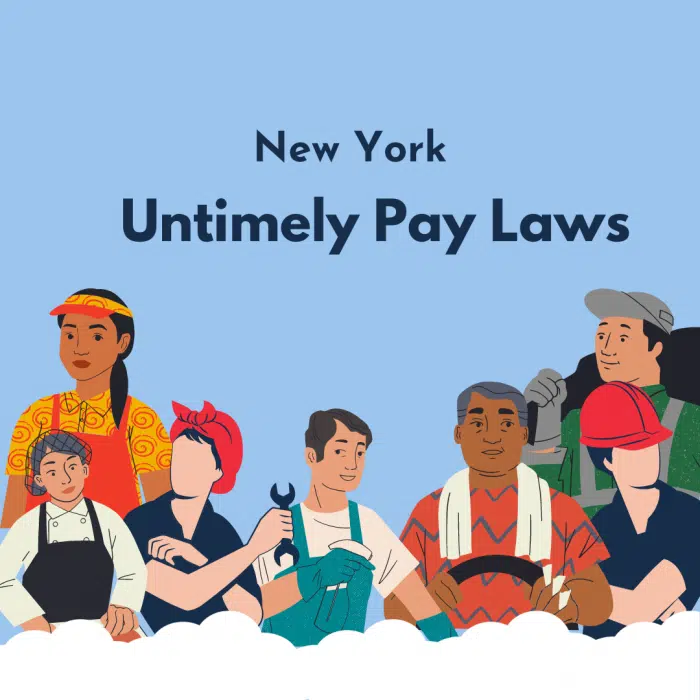New York Pay Frequency Requirements and Late Pay
New York pay frequency requirements apply to millions of workers. Under New York labor law, manual workers must be paid weekly. If you do not receive weekly pay, your employer may owe you money.
The law defines manual workers broadly. The category includes retail workers, food service workers, and many others who perform physical tasks as a regular part of their job. 
What’s the late paycheck penalty in New York? The damages in untimely pay cases are 100%. That means a fast food worker who was paid biweekly for the past six years would be entitled to three years’ wages as damages.
Who is a Manual Worker?
Under New York labor law, a “manual worker” is anyone who spends more than 25% of their working time doing physical labor. That includes a broad range of physical tasks in addition to the most commonly understood types of physical labor.
The New York Department of Labor defines manual workers as “individuals who spend more than 25% of working time engaged in ‘physical labor.‘” As the DOL explains, “the term ‘physical labor’ has been interpreted broadly to include countless physical tasks performed by employees.”
Examples of manual workers under NYSDOL standards may include:
- Retail workers
- Stockers and warehouse workers
- Airline workers
- Home aides and nursing assistants
- Food service workers
- Supermarket employees
- Security guards
- Porters
- Janitors
- Skilled laborers
Many other employees perform physical tasks as part of their jobs. They may also be covered by New York frequency of pay laws.
“A manual worker shall be paid weekly and not later than seven calendar days after the end of the week in which the wages are earned” New York Labor Law § 191
Damages for Untimely Pay
Any New York employee who qualifies as a manual worker and receives wages less frequently than once a week is being paid late. The penalty for untimely pay is 100% of the late wages for the last six years.
Eligible employees are entitled to “damages equal to one hundred percent of the total amount of the wages” paid late under New York law. [New York Labor Law § 198]
What does that mean in practice? If an employer paid biweekly, workers were paid late for one week. The employer owes damages equal to one week’s pay. If an employer paid monthly, workers were paid late for three weeks. The employer owes damages equal to three weeks’ pay.
These damages add up quickly. For every year of late payment, employers might owe workers damages equal to 6-9 months’ pay.
Untimely pay damages examples:
- A retail employee who spends more than 25% of their hours stocking shelves earned $1,000 every two weeks. Half of their pay, or $500, was late under the DOL rules. As a result, the employer owes $500 in damages for every two weeks of the employee’s earnings. This amounts to half of the employee’s annual wages in damages. The employee is owed $13,000 per year in damages for up to six years, for a potential total of $78,000.
- A food service worker spends most of her shift on her feet or on physical tasks. She receives $1,500 every two weeks. Under NY laws, $750 of her pay is late every time she’s paid. The employer owes $750 in damages for each biweekly pay period. The worker is owed $19,500 per year in damages for up to six years, for a potential total of $117,000.
- A security guard who patrols a building qualifies as a manual laborer. If their employer paid $4,000 a month, then $3,000 of the pay was late. The employer owes $3,000 in damages for every month. The security guard is owed $36,000 per year in damages for up to six years, for a potential total of $216,000.
“The court shall allow such employee to recover . . . liquidated damages equal to one hundred percent of the total amount of the wages found to be due.” New York Labor Law § 198
Filing an Untimely Pay Lawsuit
New York workers have six years to bring an untimely wage claim under New York State law.
However, large employers can apply to the New York Department of Labor for permission to pay less often than weekly. This only applies to companies with an average of 1,000 employees in New York and 3,000 employees outside of New York.
If companies received DOL permission less than six years ago, workers can still file an untimely pay lawsuit to recover damages.
In addition to damages, employers who violated the frequency of pay law must also pay “all reasonable attorney’s fees.” [New York Labor Law § 198]
Do you have an untimely pay case?
If you spent at least 25% of your time on physical tasks and your employer did not pay you weekly, contact employment lawyer Charles Joseph. His firm, Joseph & Kirschenbaum, recently settled an untimely pay class action for over $8 million. Reach out today to learn more.
Charles Joseph offers free, confidential claim evaluations. His firm charges no fee unless it recovers money for clients and clients will never be asked to pay any money.